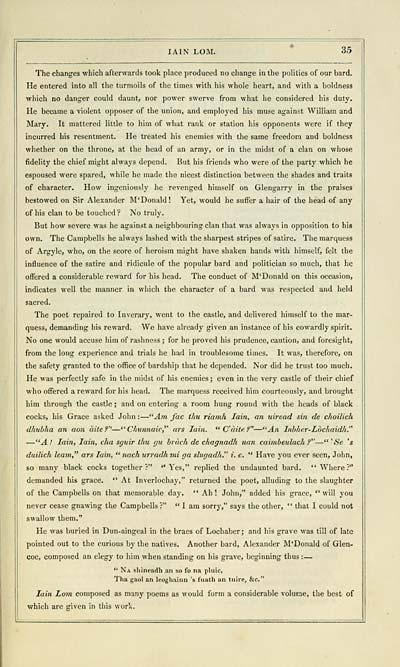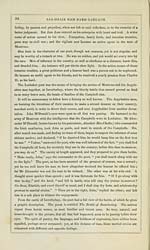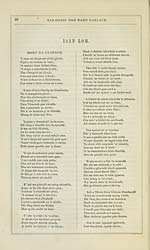Download files
Complete book:
Individual page:
Thumbnail gallery: Grid view | List view

IAIN LOM. 35
The changes which afterwards took place produced no change in the politics of our bard.
He entered into all the turmoils of the times with his whole heart, and with a boldness
which no danger could daunt, nor power swerve from what he considered his duty.
He became a violent opposer of the union, and employed his muse against William and
Mary. It mattered little to him of what rank or station his opponents were if they
incurred his resentment. He treated his enemies with the same freedom and boldness
whether on the throne, at the head of an army, or in the midst of a clan on whose
fidelity the chief might always depend. But his friends who were of the party which he
espoused were spared, while he made the nicest distinction between the shades and traits
of character. How ingeniously he revenged himself on Glengarry in the praises
bestowed on Sir Alexander M'Donald! Yet, would he suffer a hair of the head of any
of his clan to be touched ? No truly.
But how severe was he against a neighbouring clan that was always in opposition to his
own. The Campbells he always lashed with the sharpest stripes of satire. The marquess
of Argyle, who, on the score of heroism might have shaken hands with himself, felt the
influence of the satire and ridicule of the popular bard and politician so much, that he
offered a considerable reward for his head. The conduct of M'Donald on this occasion,
indicates well the manner in which the character of a bard was respected and held
sacred.
The poet repaired to Inverary, went to the castle, and delivered himself to the mar-
quess, demanding his reward. We have already given an instance of his cowardly spirit.
No one would accuse him of rashness ; for he proved his prudence, caution, and foresight,
from the long experience and trials he had in troublesome times. It was, therefore, on
the safety granted to the office of hardship that he depended. Nor did he trust too much.
He was perfectly safe in the midst of his enemies; even in the very castle of their chief
who offered a reward for his head. The marquess received him courteously, and brought
him through the castle ; and on entering a room hung round with the heads of black
cocks, his Grace asked John : — "Am fac thu riamh Iain, an uiread sin de choilich
dhubha an aon ùitef' — "Chvnnaic," ars Iain. " C'àite?" — "An Inb/ier-Lòc/iaid/i."
— "A! Iain, Iain, cha sguir thu gu brack de chagnadh nan caimbeulach ?" — "'Se 's
duilich learn," ars Iain, " nach urradh mi rja slugadh." i. e. " Have you ever seen, John,
so many black cocks together?" "Yes," replied the undaunted bard. " Where?"
demanded his grace. " At Inverlochay," returned the poet, alluding to the slaughter
of the Campbells on that memorable day. " Ah! John," added his grace, "will you
never cease gnawing the Campbells?" " I am sorry," says the other, " that I could not
swallow them."
He was buried in Dun-aingeal in the braes of Lochaber; and his grave was till of late
pointed out to the curious by the natives. Another bard, Alexander M'Donald of Glen-
coe, composed an elegy to him when standing on his grave, beginning thus : —
" Na sliineadh an so fo na pluic,
Tha gaol an leoghainn 's fuath an tuire, &c."
Iain Lorn composed as many poems as would form a considerable volume, the best of
which are given in this work.
The changes which afterwards took place produced no change in the politics of our bard.
He entered into all the turmoils of the times with his whole heart, and with a boldness
which no danger could daunt, nor power swerve from what he considered his duty.
He became a violent opposer of the union, and employed his muse against William and
Mary. It mattered little to him of what rank or station his opponents were if they
incurred his resentment. He treated his enemies with the same freedom and boldness
whether on the throne, at the head of an army, or in the midst of a clan on whose
fidelity the chief might always depend. But his friends who were of the party which he
espoused were spared, while he made the nicest distinction between the shades and traits
of character. How ingeniously he revenged himself on Glengarry in the praises
bestowed on Sir Alexander M'Donald! Yet, would he suffer a hair of the head of any
of his clan to be touched ? No truly.
But how severe was he against a neighbouring clan that was always in opposition to his
own. The Campbells he always lashed with the sharpest stripes of satire. The marquess
of Argyle, who, on the score of heroism might have shaken hands with himself, felt the
influence of the satire and ridicule of the popular bard and politician so much, that he
offered a considerable reward for his head. The conduct of M'Donald on this occasion,
indicates well the manner in which the character of a bard was respected and held
sacred.
The poet repaired to Inverary, went to the castle, and delivered himself to the mar-
quess, demanding his reward. We have already given an instance of his cowardly spirit.
No one would accuse him of rashness ; for he proved his prudence, caution, and foresight,
from the long experience and trials he had in troublesome times. It was, therefore, on
the safety granted to the office of hardship that he depended. Nor did he trust too much.
He was perfectly safe in the midst of his enemies; even in the very castle of their chief
who offered a reward for his head. The marquess received him courteously, and brought
him through the castle ; and on entering a room hung round with the heads of black
cocks, his Grace asked John : — "Am fac thu riamh Iain, an uiread sin de choilich
dhubha an aon ùitef' — "Chvnnaic," ars Iain. " C'àite?" — "An Inb/ier-Lòc/iaid/i."
— "A! Iain, Iain, cha sguir thu gu brack de chagnadh nan caimbeulach ?" — "'Se 's
duilich learn," ars Iain, " nach urradh mi rja slugadh." i. e. " Have you ever seen, John,
so many black cocks together?" "Yes," replied the undaunted bard. " Where?"
demanded his grace. " At Inverlochay," returned the poet, alluding to the slaughter
of the Campbells on that memorable day. " Ah! John," added his grace, "will you
never cease gnawing the Campbells?" " I am sorry," says the other, " that I could not
swallow them."
He was buried in Dun-aingeal in the braes of Lochaber; and his grave was till of late
pointed out to the curious by the natives. Another bard, Alexander M'Donald of Glen-
coe, composed an elegy to him when standing on his grave, beginning thus : —
" Na sliineadh an so fo na pluic,
Tha gaol an leoghainn 's fuath an tuire, &c."
Iain Lorn composed as many poems as would form a considerable volume, the best of
which are given in this work.
Set display mode to: Large image | Transcription
Images and transcriptions on this page, including medium image downloads, may be used under the Creative Commons Attribution 4.0 International Licence unless otherwise stated. ![]()
| Early Gaelic Book Collections > J. F. Campbell Collection > Sar-obair nam bard gaelach, or, The beauties of Gaelic poetry > (125) |
|---|
| Permanent URL | https://digital.nls.uk/81881594 |
|---|
| Description | Volumes from a collection of 610 books rich in Highland folklore, Ossianic literature and other Celtic subjects. Many of the books annotated by John Francis Campbell of Islay, who assembled the collection. |
|---|
| Description | Selected items from five 'Special and Named Printed Collections'. Includes books in Gaelic and other Celtic languages, works about the Gaels, their languages, literature, culture and history. |
|---|

